If your split AC not dripping water outside, there could be a few reasons why. The most common reason is that the AC unit is not properly installed, and the drain line is not connected to the outside unit.
Another reason could be that the unit is not level, which prevents the water from draining properly.
Lastly, the outside unit could be frozen, which would also prevent the water from dripping outside. If you’re not sure why your split AC is not dripping water outside, you can take help from a professional AC repair company to get your ac ok.
In this blog post, we’ll explore the potential reasons why your AC is not dripping water outside and what you can do to fix the problem. We’ll discuss common causes, such as clogged drainage pipes, blocked evaporator coils, and refrigerant leaks, and provide expert insights on how to troubleshoot each problem.
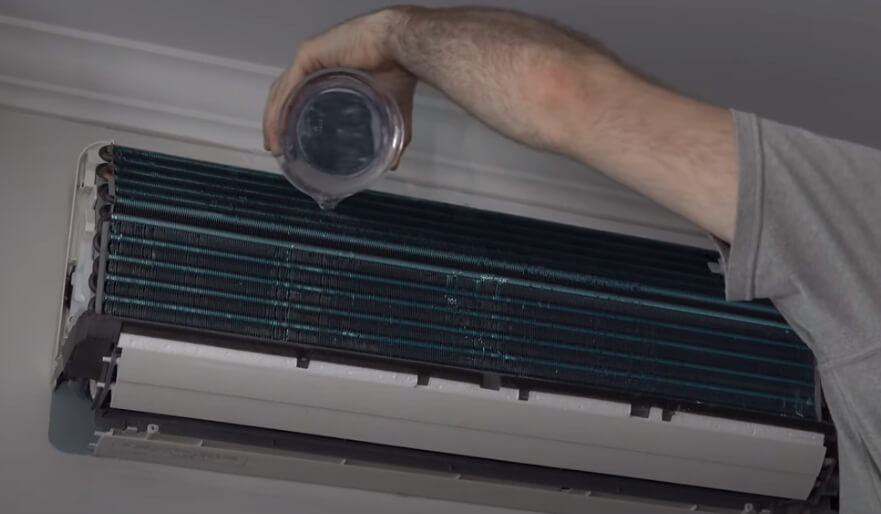
Should ac drip water outside?
If your air conditioner is dripping water outside, there are a few things you can check to see what the problem might be. First, take a look at the unit to see if there is any debris or dirt clogging the drip pan or drain line. If so, clean it out and see if that fixes the problem.
It could be that your unit is low on cooling. This is something you’ll need to have a professional take a look at, as it’s not something you can fix yourself. Finally, it’s possible that your unit is simply overworked and needs to be replaced.
If it’s an older model, it might not be as efficient as newer ones, which could be causing it to drip water. If you’re not sure what the problem is, it’s best to call a professional to take a look at your unit and diagnose the issue.
What happens if ac does not release water?
If an air conditioning unit fails to release water, it could lead to a range of potential problems. One of the most significant risks is the build-up of excess moisture in the system, which can cause mold and mildew growth.
This can result in unpleasant smells, poor indoor air quality, and even health issues for occupants. Additionally, without proper drainage, the system may not function efficiently, leading to higher energy bills and reduced cooling performance.
Finally, excess water can cause damage to the unit itself, potentially resulting in costly repairs or replacements. Therefore, it’s essential to address any issues with water release in an air conditioning unit promptly to ensure optimal performance and avoid potential health and financial risks.
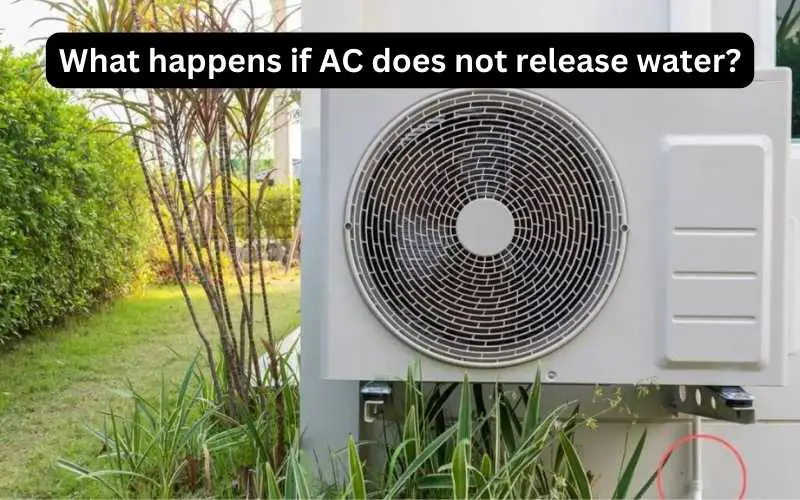
Why Is My Split AC Not Dripping Water Outside? Find the Reasons!
There could be a variety of reasons why your split AC unit is not dripping water outside. Some possible factors may include:
- Clogged condensate drain line: Over time, debris, and dirt can accumulate in the drain line, causing it to become clogged and preventing water from draining properly.
- Low refrigerant levels: If your AC unit is low on refrigerant, it may not be able to cool properly, which can lead to reduced condensation and less water dripping outside.
- Malfunctioning condensate pump: If your unit has a condensate pump, it may be malfunctioning or not work at all, which can prevent water from being pumped out of the unit.
- Improper installation: If your unit was not installed correctly, it may not be able to drain water properly, leading to water leakage and damage to your home.
- Low Outside Temperature: The outdoor temperature may be too low for the AC to produce condensation.
- Improper Installation: The unit may be tilted incorrectly, preventing water from draining properly.
It is recommended that you contact a professional to diagnose and fix the issue to ensure the proper functioning of your AC unit.
Split AC Not Dripping Water Outside – How to Fix?
If your split AC is not dripping water outside, it could be due to a variety of reasons. Here are some steps you can take to fix this issue:
- Check the drain pipe: Make sure the drain pipe is not clogged or blocked. If it is, clear the blockage using a pipe cleaner or hot water.
- Clean the filters: Dirty filters can cause the AC to freeze up, which can prevent water from dripping outside. Clean or replace the filters regularly to avoid this problem.
- Adjust the thermostat: If the thermostat is set too low, it can cause the AC to freeze up. Adjust the thermostat to a higher temperature to prevent this.
- Call a technician: If none of these steps work, it’s best to call a professional technician to diagnose and fix the issue.
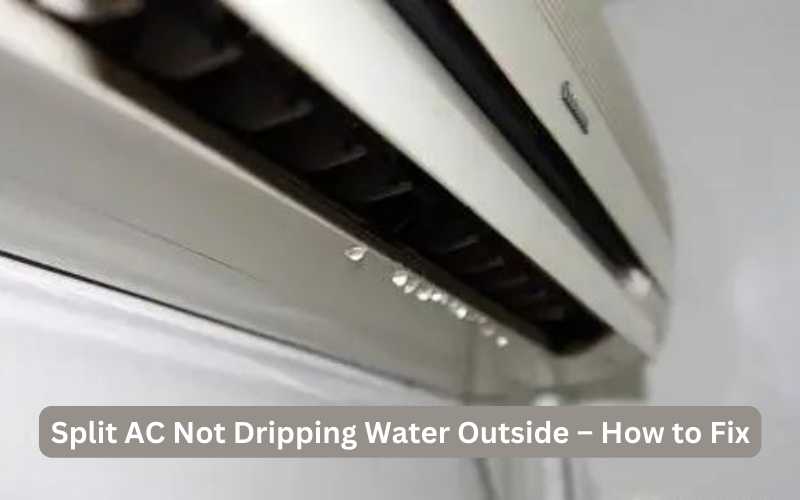
Why is my window ac not dripping water outside?
If your window air conditioner isn’t dripping water outside, there are a few possible reasons. The most common reason is that the unit isn’t properly installed. If the unit isn’t level, the water will pool in the unit and not drip out.
Another possibility is that the drainage holes are blocked. These holes are located on the sides of the unit and allow water to drain out. If they’re blocked, the water will build up in the unit and eventually leak out.
Finally, it’s possible that the unit isn’t producing enough water. This can be due to a variety of factors, including low humidity levels, a dirty filter, or a problem with the evaporator coils.
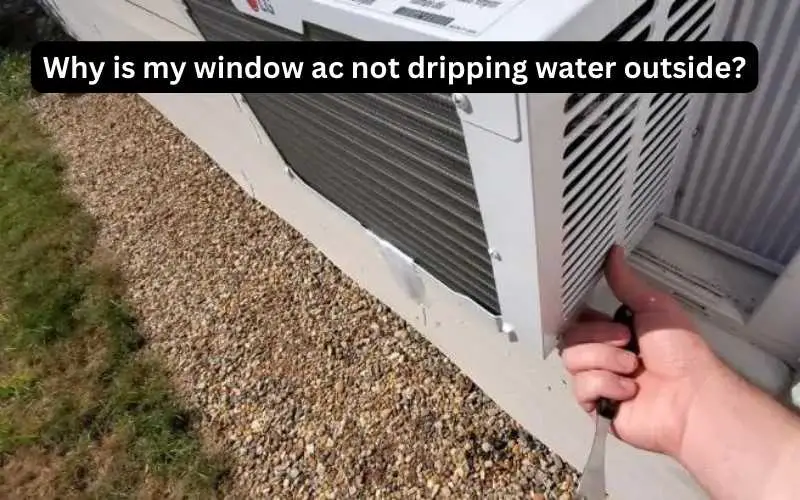
How much water should drain from air conditioner?
One of the most common questions we get here at Air conditioner repair is “How much water should drain from my air conditioner?” The answer, unfortunately, isn’t as cut and dry as most people would like it to be. Depending on a number of factors, the amount of water that should drain from your air conditioner can vary greatly.
Some of the factors that can affect how much water your air conditioner drains include:
- The size of your unit
- The humidity levels in your area.
- The temperature outside
- The age of your unit
Generally speaking, the larger the air conditioner, the more water it will drain.
This is because larger units have to work harder to cool down a space, and as a result, they produce more condensation. The humidity levels in your area can also affect how much water your air conditioner drains.
If it’s particularly humid outside, your air conditioner will have to work harder to cool your home and, as a result, will produce more condensation.
The temperature outside can also play a role in how much water your air conditioner drains. If it’s very hot outside, your unit will have to work harder to cool your home and will produce more condensation.
Conversely, if it’s cooler outside, your unit won’t have to work as hard and won’t produce as much water.
No drip window air conditioner
If you’re looking for a window air conditioner that won’t drip water on your floor, the no drip air conditioner is the perfect choice.
This type of air conditioner uses a special condensation system that collects water in a reservoir, so it can’t drip on your floor. The no drip air conditioner is a great choice for people who want to avoid the mess of dripping water, but it’s also a good choice for people who want to save energy.
This type of air conditioner is more efficient than traditional air conditioners, so it will save you money on your energy bills. If you’re looking for a window air conditioner that’s both efficient and won’t drip water on your floor, the no drip air conditioner is the perfect choice.
Inverter ac not dripping water
If your inverter AC is not dripping water, there are a few potential causes. First, check to see if the unit is properly plugged in and that all the connections are secure. Next, check the filter to see if it is clean and free of debris.
If the filter is dirty, it will need to be replaced. Finally, check the condenser coils to see if they are clean and free of debris. If the coils are dirty, they will need to be cleaned.
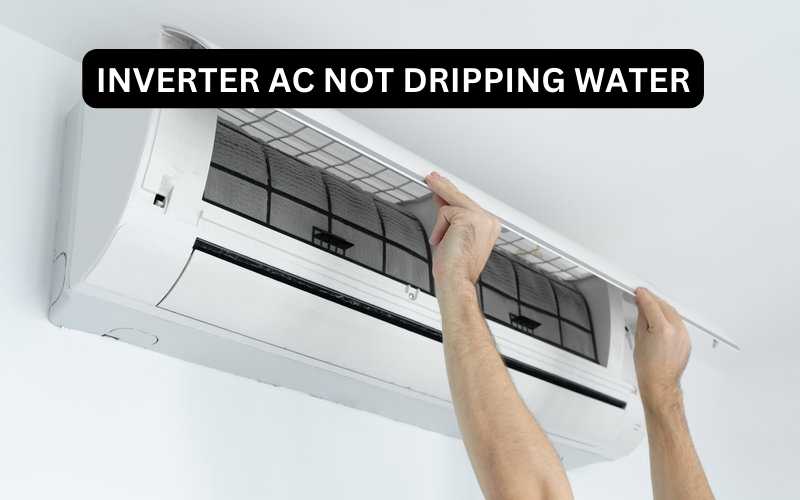
Portable air conditioner no water coming out
If your portable air conditioner is not putting out any water, there are a few things you can check to troubleshoot the issue. First, make sure that the unit is properly filled with water. If it is not, add water until it reaches the full line.
Next, check the air filter and clean or replace it if it is dirty. Finally, check the exhaust hose to make sure it is not kinked or blocked. If all of these things are in order and the unit still isn’t putting out water, it may be a sign that the unit needs to be replaced.
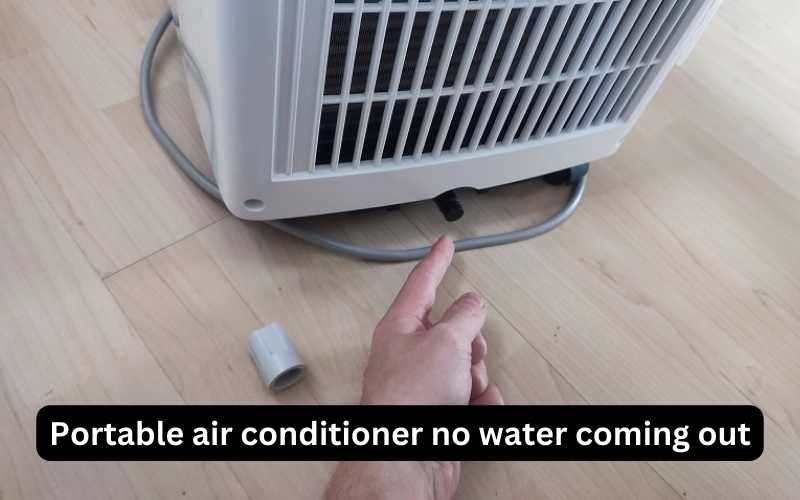
Ac not draining water properly
If your AC isn’t draining properly, it could be due to a clogged drain line.
This is a common problem that can be easily fixed.
- First, locate the drain line. It is usually located near the outdoor unit.
- Next, use a wet/dry vac to suck out any debris that may be blocking the line. If this doesn’t work, you may need to use a plunger to clear the line.
- Finally, flush the line with a hose to remove any remaining debris.
Car air conditioner not dripping water
If you notice that your car’s air conditioner isn’t dripping water, it could be a sign that there’s a problem with the system.
The water that drips from the air conditioner is actually a byproduct of the cooling process, so if it’s not happening, it could mean that the air conditioner isn’t working properly. There are a few possible reasons why your car’s air conditioner might not be dripping water.
One possibility is that the system is low on refrigerant. When the refrigerant level is low, the air conditioner can’t cool the air properly, and the water that’s supposed to drip out doesn’t form. Another possibility is that there’s a blockage in the system.
This could be a blockage in the drain line, which is the line that the water is supposed to drip out of. If there’s a blockage, the water can back up into the air conditioner and cause damage.
If you notice that your car’s air conditioner isn’t dripping water, it’s important to have it checked out by a mechanic. They can diagnose the problem and make the necessary repairs.
Why is my AC not dripping water outside?
If your AC unit is not dripping water outside, there are a few potential reasons why. The most common reason is that the unit is not turned on. If the unit is turned on, but still not dripping water, it could be because the evaporator coils are frozen.
Another potential reason is that the condensate drain line is clogged. If the evaporator coils are frozen, this is typically due to low air flow. Low air flow can be caused by a number of things, such as a dirty air filter, closed vents, or a blocked return air duct.
To fix this, you’ll need to increase air flow to the unit. This can be done by cleaning the air filter, opening up any closed vents, and making sure the return air duct is clear. If the condensate drain line is clogged, this can be due to a number of things as well.
The most common culprit is algae. Algae can grow in the condensate drain line and eventually clog it. To fix this, you’ll need to clean out the condensate drain line.
Why is there no condensation from my AC?
One of the most common questions we get from customers is “Why is there no condensation from my AC?”
While it may seem like a simple question, there can be a few different factors at play. Let’s take a look at a few of the reasons why your AC may not be producing any condensation.
One of the first things to check is the age of your AC unit. If your unit is more than 10 years old, it may be time for an upgrade. Older units are less efficient and may not be able to produce the same level of condensation as a newer model.
Another factor to consider is the climate you live in. If you live in an area with a lot of humidity, your AC unit may not need to produce as much condensation to keep your home comfortable. Finally, the type of AC unit you have can also affect the amount of condensation it produces.
Central AC units tend to produce more condensation than window units. If you’ve checked all of these factors and your AC unit still isn’t producing condensation, it’s time to call in a professional. There may be an issue with your unit that a trained technician can help resolve.
Is your AC drain line outside suppose to drip?
The answer to this question depends on a few factors. First, it is important to check your AC unit’s owner’s manual to see if there are any specific instructions regarding the AC drain line. If there are no specific instructions, then it is generally safe to assume that the AC drain line should not be dripping.
However, there are a few exceptions to this rule. If your AC unit is located in an area where the temperature is regularly below freezing, then it is possible that the AC drain line may freeze and cause a small amount of water to drip from the line.
If this happens, it is important to thaw the line as soon as possible to prevent any damage to your AC unit.
Another exception to the rule is if your AC unit is located in an area with high humidity. In this case, the AC drain line may sweat and cause a small amount of water to drip from the line.
This is generally not a cause for concern, but if the dripping becomes excessive, it is important to contact a qualified AC technician to check the unit and make sure there is no other issue causing the excessive dripping.
Do all air conditioners drip water?
No, not all air conditioners drip water. In fact, only a small percentage of air conditioners actually drip water. The vast majority of air conditioners use a refrigerant to cool the air, and the refrigerant does not condense into water.
There are a few air conditioners that use an evaporative cooling system, and these units do use water to cool the air. However, even evaporative air conditioners do not typically drip water. If your air conditioner is dripping water, it could be due to a clogged condensate line or a problem with the evaporator coil.
Conclusion
If your split AC is not dripping water outside, there are a few potential reasons why. One possibility is that the unit is not properly installed and the drain line is not connected to the outside unit. Another possibility is that the unit is not level, which prevents the water from draining properly.
Finally, it could be that the unit needs to be cleaned and the filters replaced. If you are not sure what the problem is, it is best to call a professional AC repair person to take a look.